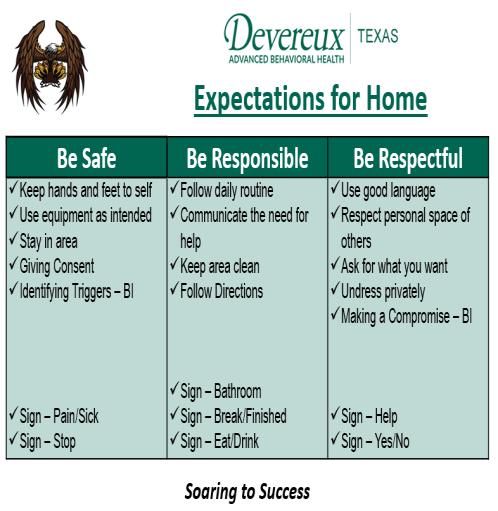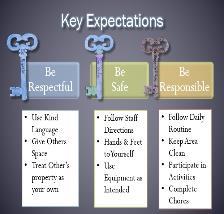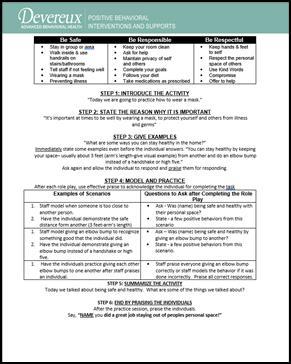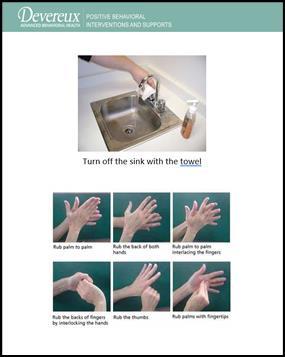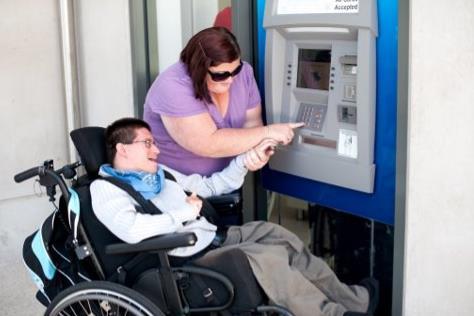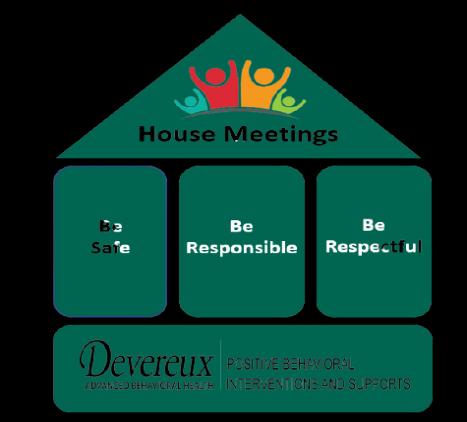







Welcome Statement from Our Executive Director
Dear Parents/Family Members,
Welcome to Devereux Advanced Behavioral Health’s New York Center. We know it can be a very difficult decision to entrust your family member in to our care. Our goal is to make this a positive and supportive experience for both you and your family member.
As you spend your first day with us we want to ensure you and your child feel welcome and safe. Please take all the time you need to ask questions of your child’s new Treatment Team members. We are committed to making your child’s treatment effective, efficient and person- and family-centered. Each time you leave our campus, you should feel confident in Devereux and our ability to provide a safe and positive experience for your child.

I also want to ensure that you are aware of our culture of Servant Leadership. Our mission is to devote ourselves to serving the needs of our individuals and families by demonstrating Respect, Accountability, Encouragement, Appreciation and Trustworthiness. These behaviors should be evident in all interactions between Treatment Team members and those we serve on a daily basis: You, your child and your family!
Finally, we need your active involvement to make this a success. You will have input into all decisions, treatment plans and goals, and are invited to participate in all family-oriented activities we offer at Devereux New York.
This handbook is designed to answer some of the many questions you are likely to have about your child’s treatment and how our programs work. Of course, we recognize that not all of your questions will be addressed in this handbook, so again, I encourage you to speak with your child’s Treatment Team to obtain any needed clarification. We are here for you, and your child’s success depends on teamwork and collaboration.
We are honored and humbled to be part of your family’s support system. Be involved. Ask questions. Use your Treatment Team as a resource to help pave the way for a future of success for your child. We look forward to partnering with you to achieve the maximum benefit of the services we can provide to you and to your family!
Sincerely,
John Lopez Executive Director
Devereux Advanced Behavioral Health - New York



Information General to all Devereux New York centers:
Core Value Statement: Why we work toward the Devereux Mission
Devereux believes everyone has the right to safe, healthy, quality life experiences and that everyone has the ability to learn and progress within various stages of their life in any setting, including their schools, homes and local communities. Our goal is to provide ongoing opportunities for a meaningful quality of life, as defined by the people receiving Devereux supports, to help them unlock their highest potential.
Office for People with Developmental Disabilities (OPWDD)
- from the OPWDD.ny.gov
website
The New York State Office for People With Developmental Disabilities (OPWDD) is responsible for coordinating services for nearly 140,000 New Yorkers with developmental disabilities, including intellectual disabilities, cerebral palsy, Down syndrome, autism spectrum disorders, Prader-Willi syndrome and other neurological impairments. It provides services directly and through a network of approximately 650 nonprofit service providing agencies, with about 80 percent of services provided by the private nonprofits and 20 percent provided by state-run services.
OPWDD was created in 1978 as the Office of Mental Retardation and Developmental Disabilities, an independent cabinet-level state agency, largely because of the need for an autonomous entity to implement the Willowbrook consent decree and the resulting closure and downsizing of institutions. In the decades that followed, it has become one of the state’s largest agencies. Individuals supported by this agency and their family members forged a strong working partnership that shaped the way the system grew to support increasing numbers of individuals to live with greater independence in their communities.
In 2010, the agency and its stakeholder partners marked an historic milestone for the people they support when New York State changed the agency’s official name, eliminating the term “mental retardation” from its new title.
Supports and services, which include Medicaid funded long-term care services such as habilitation and clinical services, as well as residential supports and services for 43,000 people, are primarily provided in community settings across the state. Largely because of intensive treatment needs, about 200 people (down from approximately 30,000 in the 1970s) continue to reside in institutional settings such as developmental centers, secure facilities, and residential schools for children jointly operated by OPWDD and the New York State Education Department.
In addition to these Medicaid services, OPWDD also provides New York State-funded family support services, which are designed to assist families in providing care for their loved ones who live full-time in their family home, and employment supports, which include ongoing job coaching, job matching, and vocational training.



Health Home Care Management services are provided by Care Coordination Organizations (CCOs) to assist people with developmental disabilities and their families in gaining access to services and supports appropriate to their needs. Health Home Care Management services are designed to:
• Provide comprehensive, person-centered care planning using a network of care managers and providers (team approach);
• Provide enhanced coordination and integration of primary and behavioral health services as well as access to medical and dental services
• Identify community based resources and make connections to community services and supports, housing, social services, and family services; and
• Use technology to link all services.
Care Management services are provided by qualified Care Managers who use a person-centered planning process in developing, implementing and maintaining a person’s Life Plan.
An alternative form of care management, which is also provided by CCO care managers is Basic Home and Community Based Services (HCBS) Plan Support. Basic HCBS Plan Support services is a very minimal coordination option and does not include coordination of health care or mental health services.
Human Rights Committee (HRC)
At times, a person may need treatment or interventions that are considered by New York State to be restrictive, intrusive or which limit the person’s rights in some way. This may include prescribed medications, clinical plans, or agreements for the plans of others that change the way a person experiences the environment. In those times, New York State Office for People with Developmental Disabilities (OPWDD) requires that a Human Rights Committee (HRC) review the treatment plans. This committee is responsible for protecting the rights of the individual, ensure that these restrictive or intrusive interventions are necessary and that there is documented informed consent for the treatment.
Plans or interventions reviewed by the HRC committee require informed consent. Informed consent means the person providing consent clearly understands how the treatment will benefit the person, what risks the treatment may present for the person, and how the treatment will be provided to the person in detail. The person receiving supports, if at least 18 years of age and has not been clinically assessed as unable to give informed consent for the treatment can give informed consent. A legal guardian may give informed consent for a person either because the person is not yet 18 years old or because the person is clinically assessed as unable to provide informed consent for the treatment. An involved advocate of the person may give informed consent if the person is unable to provide informed consent and does not have a legal guardian. An Informed Consent Committee may give informed consent if the person is unable to provide informed consent and does not have a guardian or advocate or if the person who usually gives consent for the person has not given a response.
Consent is not required for all treatment. Also, the person asked to provide consent may choose not to approve the treatment. If a treatment is declined, there will need to be a plan for how to meet the need that the declined treatment was meant to help. Sometimes you may want to take back consent. The person consenting may take back consent at any time by providing a written note that is signed



and dated and that tells Devereux which treatment is no longer consented to. This needs to be provided to the service location’s management.
Informed Consent Committee is a professional group made of different disciplines and provider agencies separate from Devereux. The committee reviews restrictive, intrusive, or rights limiting treatment plans, including medication, and gives informed consent when a non-consenting person does not have another person to give consent or when the one who typically gives informed consent for the person has not provided a response to the ordered treatment. This committee will not overturn a choice made by the consenting person but acts when there has been no choice made or there is no one at all to make a choice about the treatment for the person.
Informed consent must be given in writing by signing and dating a form. Devereux will provide forms to the consenting person that contain all needed information and a place to sign and date. Informed consent may also be given verbally for a short period of time to two Devereux employees who are both there to hear the consenting person agree or disagree to the treatment. Written informed consent may last only up to one year from the day it was signed. There are some treatments that may be consented to or planned for shorter periods of time. Verbal informed consent may last only up to 45 days from the day it was given. After then, written consent is needed to continue the treatment.
If someone needs information in a language other than English, Devereux will offer a way to get the information in the consenter’s language.
Crisis Interventions & Prevention
Strategies for Crisis Intervention and Prevention - Revised
The focus of this revised program is to empower staff with methods of assisting and teaching individuals to maintain self-control and to train staff to engage in proactive methods of positive behavior support. he SCIP-R curriculum supports staff awareness of the needs of persons with developmental disabilities and methods of preventing crisis.



My School
School Vision
In conjunction with Devereux’s Mission, students of the Red Hook School will be prepared to be active members of their community and participate as independently as his or her abilities allow. Each student will be provided structured, supportive, and creative learning opportunities in order to achieve this.
Education Building
The education building at Devereux’s Red Hook Campus contains twenty six classrooms, a library, a full gymnasium, reading resource room, vocational training room as well as related service, clinical and medical offices. All of our classrooms are equipped with interactive instructional technology.
New York State Education Department (NYSED)
Our school is a NYS approved private school serving students with disabilities and is located within the Special Education Quality Assurance, (SEQA) Hudson Valley Region. You may contact the SEQA’s regional office at 518-473-1185.
Classroom Ratios
Classrooms at Devereux will have one teacher, and one, two or three NYS certified Teaching Assistants. Class size is six students. The Devereux Red Hook campus does not offer additional 1:1 aides due to the enhanced staffing ratios approved by NYS.
School Schedule
Students arrive to school at 8:30am and dismissal is at 3:00pm. Our teachers remain with students during their lunch periods to support mealtime goals and foster friendly communication skills.
Policies
Dress Code
Our School Dress code is consistent with consistent with NYSED regulation 100.2(I)(2)(ii)(a) and only applies to students attending our school program. It does not apply to residential individuals in their homes or adult individuals.
Appropriate items of clothing include: jeans, pants, khakis, skirts, dresses, T-shirts, long sleeve shirts, vests, sweaters, blouses, socks, sandals, sneakers, shoes with laces/zippers, slip on shoes, sweatpants, hoodies, jackets, coordinated “suits”, ties. In the spring/summer months (beginning at the last Friday of April until the last Friday of September), tank tops and shorts/skirts may be worn as long as they do not meet guidelines associated with unacceptable clothing. Headgear (i.e. hats, scarves, etc.) that are not associated with a cultural or religious celebration or a medical condition, should be removed while indoors. Jewelry is allowed as long as it is in good repair and has no sharp edges.
Inappropriate items of clothing include: shirts with reference to substance use, shirts with vulgar language (i.e. cursing), shirts that expose pectorals/breasts/nipples of either sex, pants that expose



bottom cleavage or underwear, skirts or shorts that expose underwear at the leg, shoes with high heels or hidden wheels, slippers, flip flops, head gear associated with gangs.
Visits
During the first 30 days it is recommended that new students stay on campus to acclimate to their new environment, and so that the team and the child can get to know each other in this environment. We ask that parents visit with the residential students outside of the school day. If parents wish to observe their child in the classroom, this should be discussed with the Treatment Team beforehand. Requests can be made through the QIDP/Case Manager.
Transportation on Snow Days & Holidays
Transportation for day students is coordinated by the student’s home school district. Please check with your child’s home district to determine if transportation will be provided or delayed for your child on snow days. The Devereux Education Department does not close on snow days. The Red Hook School has a school calendar, which may not match your child’s local school calendar. Please check with your district regrading transportation during holidays where Devereux is not closed.
Civil Rights Statement
In accordance with Federal civil rights law and U.S. Department of Agriculture (USDA) civil rights regulations and policies, this institution, its Agencies, offices, and employees, and institutions participating in or administering USDA programs are prohibited from discriminating based on race, color, national origin, sex, disability, age, or reprisal or retaliation for prior civil rights activity in any program or activity conducted or funded by USDA.
Persons with disabilities who require alternative means of communication for program information (e.g. Braille, large print, audiotape, American Sign Language, etc.), should contact the Agency (State or local) where they applied for benefits. Individuals who are deaf, hard of hearing or have speech disabilities may contact USDA through the Federal Relay Service at (800) 877-8339. Additionally, program information may be made available in languages other than English.
To file a program complaint of discrimination, complete the USDA Program Discrimination Complaint Form, (AD-3027) found online at: http://www.ascr.usda.gov/complaint_filing_cust.html, and at any USDA office, or write a letter addressed to USDA and provide in the letter all of the information requested in the form. To request a copy of the complaint form, call (866) 632-9992. Submit your completed form or letter to USDA by:
Mail: U.S. Department of Agriculture, Office of the Assistant Secretary for Civil Rights 1400 Independence Avenue, SW, Washington, D.C. 20250-9410; Fax: (202) 690-7442; or Email: program.intake@usda.gov
This institution is an equal opportunity provider
Immunizations
As of September 2019, NYS will no longer allow any religious exemptions for immunizations. All immunizations are required as of this date in order to be allowed in any school setting.



Instructional Program
Curriculum
Instruction is provided in core subjects such as language arts, science, mathematics and social studies. Instruction is focused on functional academic skills, community integration and social/emotional skills. Classrooms also participate in health, art, music, library and adaptive physical education classes. All students are encouraged to participate in our daily morning workout that incorporates music and motion in a fun group activity.
Vocational Program
At the Red Hook School we strive to prepare students for life after school as an adult. The Vocational Department works to develop both specific job set skills work behaviors needed in any job. This can occur on campus work training, community work training, classroom activities and paid work experiences across our campus.
Related Services
The Red Hook School provides the following related services: Speech Therapy, Occupational Therapy and Physical Therapy as well as Parent Training and Counseling. Related services are provided during the school day and may occur in the therapy room (“pull out”) or within the classroom (“push in). For training and counseling, parents meet regularly with the treatment team and discuss skills learned in school in order to generalize them to the home environment.
Assistive Technology
Devereux service providers and teachers provide instruction using augmentative communication to students requiring this service as per their individualized education plan, IEP.
Standardized Assessments
Devereux students participate in the New York State Alternative Assessments (NYSAA). At the end of their education students will graduate with a NYS Skills and Achievement Credential.
Special Activities
In addition to regular classroom programming, The Red Hook school offers a number of additional activities to enrich the school day. This includes a variety of assemblies related to arts, science and culture for example. We also develop a number of school wide events including International Day, Science Fair, Beatification Day, the Talent Show, Harvest Day, Water Day, the Carnival, and Spirit Week. Classrooms also plan community field trips and special events such as the annual Holiday and Pool Parties.
Students Who Advocate Group (SWAG)
Members run a school-wide poll every year which includes words and images for the student body to vote on. They then take that information and while voicing the wants and needs of the student body, they learn advocating skills by doing. They compose letters, create posters, and request meetings with Senior Programming staff to help the wants and needs of the student body be heard. They are learning that the voice of many is louder than the voice of one, how to advocate and negotiate respectfully and when necessary, to accept negative outcomes and move forward.



Devereux Youth Advisory Council (DYAC)
This group of young advocates meets twice a month with Devereux National and DYAC members from other centers to talk about projects important our Devereux students. NY’s projects have included creating a coloring book “A Book On Bullying” which was written and illustrated by these students and a Bathroom Privacy campaign to promote more privacy for our individuals who do not have a medical, behavioral or skill building need with hygiene tasks.
Health & Wellness
The school program offers a variety of physical activities to all students in the school including, daily kickball, sports tournaments, weekly yoga classes and our daily “morning workout”.
School Personnel Administration
Principal: Develops and administers the school program to conform to the educational, social and emotional needs of the students and ensures that the program meets the criteria of licensing and accrediting agencies. Consults with all departments to analyze the suitability of the educational program for meeting the students' changing needs and, in conjunction with educational supervisors and staff, implements curriculum revisions as necessary.
Assistant Principal: Oversees the development, implementation and monitoring of the curriculum, classroom behavioral assessment, and academic assessments as designated by the principal. Supervises and evaluates teachers and program aides in partnership with the School Principal and takes responsibilities of school program in the School Principal’s absence.
Curriculum Coordinator: Oversees the development, implementation and monitoring of the curriculum, classroom behavioral assessment, IEP goals and academic assessment. Supervises and evaluates teachers and teaching assistants in partnership with the School Principal and takes responsibilities of school program in the School Principal’s absence.
Vocational Coordinator: Develops and monitors implementation of vocational training programs. Designs vocational curricula and training projects. Coordinates on and off campus vocational projects.
Coordinator of Speech and Language: Evaluates, remediates and provides consultative assistance to education staff on speech, language voice and hearing problems that impede students’ effective communication. Coordinates program planning for students and recommend remedial techniques for staff implementation.
Lead Teacher Assistant Supervisor: Supervises the Lead Teacher Assistants and Teacher Assistants (TAs). Oversees the placement of personnel in the morning, in the dorms, the community and the school. Acts as the Executive of the Day (EOD) for the school days.
Administrative Assistant: Provides Administrative Assistance to the Director of Campus Residential Services/Principal including correspondence, mail and other organizational assistance. Maintains



operation of the office, receives phone calls, replies to as many inquiries as possible, records messages, routes calls to appropriate personnel. Places outgoing calls as appropriate. Coordinates response to classroom requests for assistance.
Teachers & Teaching Assistants
Teachers: Implements structured educational programs for developmentally disabled students. Provides additional services such as testing, assessment, ISP updates and other duties as directed by the School Principal.
Teaching Assistants: Assist teacher and residential staff in planning and implementing instructional and residential programs for individual students. Assists in establishing a classroom environment conducive to academic and social learning by helping to maintain order. Guides students in socially appropriate behavior on and off campus.
Vocation Specialists: Provide instruction in vocational training.
Behavior Specialists: Provides direction and mentorship to Education staff relative to behavioral strategies, maintains order and appropriate behavior within the setting by addressing students' actions and encouraging/reinforcing positive behavior. Implements creative procedures to promote growth and development of the residents as per Treatment plans and aides in training direct care staff.
Clinical Personnel
Clinicians: Conducts individual and/or group therapy as required by the student’s IEP. Develops and oversees implementation of treatment plans. Consults with education and residential staff on Behavior Modification and other treatment techniques in the classroom and residences. Assists in crisis intervention as needed.
Qualified Intellectual Disabilities Professional (QIDP)/Case Managers: Serves as liaison between parents, agencies, and staff in planning and implementing student's program and informs parents/agencies of student's needs, progress, etc. Maintains knowledge of student's progress and advises staff on student's home situation and funding resources.
Health Office Personnel
Nurse: Administers medical care and prescribed treatments and medications to the students.
Medical Assistant: Assists medical staff in the coordination of all medical appointments and care of students / participants and in the daily functions of the department.
Director of Nursing: Coordinates the overall medical services. Coordinates the scheduling and provision of medical services including on-site nursing, consulting services and off- site clinical visits and pharmaceutical services.



Meeting Types
Meetings that involve your school district
CSE Pre-Admissions Meeting: Attended by involved family members/guardians, the funding school district, the curriculum coordinator, admissions team member and possibly Treatment Team members.
It is at this meeting that the admission date is finalized. During the meeting, participants go over the classroom ratio, related services we provide, levels of supervision, medication procedures and anything else the parent or district need to know.
30 Day program Review: Attended by involved family members/guardians, the funding school district, the curriculum coordinator, admissions team member and Treatment Team members. During this meeting participants discuss the students’ progress thus far. If needed, goals are modified or new goals are proposed related to the new program. Related services are updated as needed.
Annual Review: Attended by the curriculum coordinator, teacher, clinician, case manager and related service providers (by request). The purpose is to discuss overall progress for that year (goals, behavior, voc, related services, home/residence etc.) and to propose new goals for the following school year, discuss transition planning and make placement recommendations. This meeting is held annually.
Program Review This meeting can be called at any time. It is typically when there is an issue or if a student is close to aging out. Participants at this meeting may vary depending on the agenda for the meeting.
Triennial Reevaluation (Three-Year Review) The Individuals with Disabilities Education Act (IDEA) requires schools to reevaluate students with IEPs at least once every three years. This is known as a triennial reevaluation or review.
The purpose of the triennial is to see if the students’ needs have changed. It is also to see if they still qualify for special education services. The referring district will coordinate with Devereux on the completion of this evaluation.
Treatment Team Meetings
Quarterly Progress Reviews: Every 3 months the entire Treatment Team meets to discuss the progress of the student as well as any issues or concerns.
USU Meetings: Clinical and program staff review physical intervention use and behavior plans to ensure appropriate to student and needs are being addressed.
Treatment Team Meeting (TxTm) Meetings: This type of meeting is typically for issues of concerns where the Team comes together to discuss and develop plans to resolve them.
Challenging Behavior Meetings: Meeting scheduled to address behaviors that are nor responding to typical interventions and require an additional level of oversight and support.



Vacations
Residential & ICF Student Programming During Breaks: The school calendar will be given to you each year. This calendar will show you travel days and vacation periods. For children who do not go home during a vacation, they will program out of the home during that time. On campus we have Lead Teachers Assistants who supervise vacation programs, they assign staff, Teachers Assistants, to houses during the day. Each has a shift leader. The shift leader will develop daily activities for the vacation.
School Nutrition
Meal Time Assessments/Diets/Allergies/non-Kosher Kitchen Each student at Devereux has a diet order, which will best support his or her individual nutritional needs. The diet order is determined based on weight and height, growth trend, any medical issues that can be treated with a special diet, any documented food allergies, and religious preferences. The diet order may be changed as growth trends, and as health issues change.
An annual nutrition assessment is completed for each student. The dietitian will monitor growth trends, food preferences, how well a student is tolerating their diet, lab results, and make recommendations about the Calorie level and any other modifications. As part of our choking prevention requirements. The Occupational therapist/ Speech and Language Pathologist will do a mealtime assessment for each student to advise about ideal consistency, size of food pieces, and any eating support or adaptive equipment that is indicated during mealtime.
The cafeteria staff develops the weekly menu plan, and will plate the meals for students based on the diet order. Each day the student are given a choice of meals. Usually they can choose between the main meal (usually hot) and several sandwich choices.
The Red Hook Campus operates a non-kosher kitchen. This means that staff makes every effort to respect the kosher needs of our students but we do not offer a kosher kitchen.
School Lunch Program Each school day, students are provided lunch in our cafeteria. Students and classroom staff each together during the lunch period. Free Breakfast is offered to day students each morning in the school setting. Residential students are offered breakfast in their home.



What is D-PBIS?
Devereux Positive Behavioral Interventions and Supports (D-PBIS) is a tier-based, trauma-informed framework that provides a seamless, multi-layered system of support for individuals across all Devereux programs. As a trauma-informed framework, D-PBIS reflects the following trauma-informed care principles: Safety; Trustworthiness and Transparency; Peer Support; Collaboration and Mutuality; Empowerment Voice and Choice; Cultural, Historical and Gender Issues; Ongoing Performance Improvement and Evaluation. The goal of D- PBIS is to address the social, emotional and behavioral needs of all individuals using a person-centered approach to assessment, support planning and treatment intervention.
D-PBIS is a proactive, preventative approach that focuses on the strengths of each individual. This framework emphasizes the prevention of challenging behaviors by teaching socially acceptable skills, within the context of a safe and positive environment. By providing choice, decision making and problem solving, each individual can become active participants in their daily routines within the context of their home, work, and community environments.
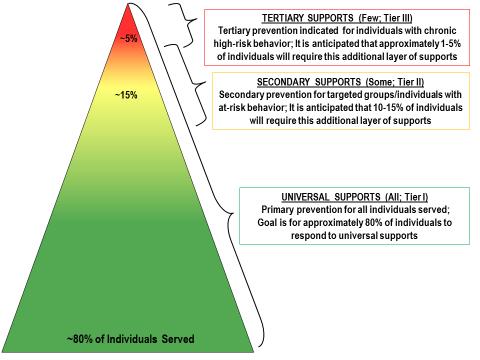
How is D-PBIS a Trauma-Informed Model?
Our D-PBIS program provides Devereux staff and the individuals we care for with a common vision, language, and experience. As a trauma-informed framework, D-PBIS acknowledges the prevalence of traumatic occurrences in an individual’s life and reflects the following trauma-informed care principles
As a result, our dedicated professionals are:
• Sensitive to the unique needs of individuals
• Mindful to avoid re-traumatization
• Aware of the need for a sense of safety



The program also provides a flexible framework of supports by:
• Creating a safe environment
• Supporting consistency
• Emphasizing our role in modeling appropriate boundaries
• Providing a mechanism for adapting the environment to meet our individuals’ needs
• Emphasizing the teaching of emotional self-regulation
• Providing opportunities for choice
• Collaborating with families, caregivers, and key agency partners

Behavioral Expectations
D-PBISis Trauma-Informed
Behavioral expectations are guidelines used to define and clarify behaviors expected of all individuals served across all settings. These behavioral expectations include be safe, be responsible, and be respectful, and are often referred to as the “3 Be's” in the program. These expectations provide a tool for staff to use in teaching, modeling, and responding to behavior, and provide a structure for
collaboration and mutuality between individuals and support staff.The purpose of behavioral expectations is to create a positive, trauma-informed culture and an environment that is safe, predictable, and consistent. It is expected that all staff will model, teach, and reinforce these expectations for individuals across all settings



Being open and clear about behavioral expectations and rules allows us to set the stage for a positive and supportive culture for everyone. It provides a map for all individuals to follow as we teach prosocial behaviors and reinforce the idea that everyone is a member of the community.
The purpose of behavioral expectations is to create an environment that is safe, predictable, and consistent. A consistent program can be achieved through providing staff and individuals with a…
• Common language = behavioral expectations/rules
• Common vision = understanding of behavioral expectations/rules
• Common experience = everyone (individuals and staff) is held accountable for knowing and demonstrating the behavioral expectations/rules.
o Establishing predictable routines and active engagement in preferred activities
o Choice and decision making
Teaching Matrix
The Teaching Matrix specifically defines being responsible, respectful, and safe for different settings and activities that individuals encounter throughout the day. Staff use the Teaching Matrix to teach, review, and reinforce the program-wide expectations and setting-specific rules, which all reflect trauma-informed care principles.
Setting-specific behaviors from the teaching matrix are posted in key locations to assist staff in actively teaching, reviewing, and reinforcing the behavioral expectations. Posters like the example below are posted to promote transparency regarding expectations and remind individuals and staff of the expectations in each setting.
